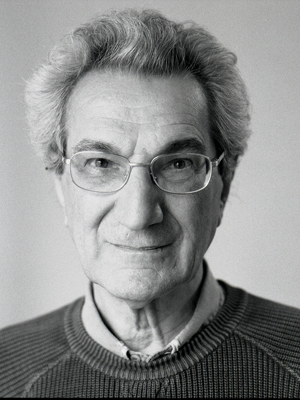Mr. Negri’s visit to Japan has unfortunately been cancelled. Please refer to the following page for details of the cancellation of his trip to Japan (we are sorry the page is available only in Japanese).
- [I-House Academy / I-House Ushiba Fellowship Public Lecture]
- Speaker: Antonio Negri, Philosopher
- Moderator: Kang Sangjung, Professor, University of Tokyo
- Commentator: Yoshihiko Ichida, Professor, Kobe University
- Date & Time: Saturday, March 22, 2008, 6:00 pm- 9:00 pm
- Venue: Iwasaki Koyata Memorial Hall, International House of Japan
- Admission: 1,500 yen (Students: 1,000 yen, IHJ Members: Free)
- Language: Italian/Japanese consecutive interpretation provided (for lecture) ;
- French/Japanese consecutive interpretation provided (for Q & A session)
Antonio Negri
Photo Copyright: David Balicki
Mr. Balicki’s copyright is represented by Le Bureau des Copyrights Français

Born in Padua, Italy, 1933. Starting off his academic career as a scholar of political philosophy centering on Marx, Mr.Negri shaped the theoretical foundation for a new social movement known as “Autonomia” supported by the socially disadvantaged. The movement jolted all parts of Italy. When it was in a stage of further development, however, he was accused of masterminding the kidnapping and murder of Italian Prime Minister Aldo Moro by the militant organization “the Red Brigades” and plotting to overthrow the government. Shortly afterward, although no link was established between Negri and the Red Brigades, he was convicted for his political activities and critical discourse against the government. During his imprisonment awaiting trial, he announced his candidacy for and was elected to the Italian legislature. Owing to parliamentary privilege, he was permitted to leave prison, but this was abrogated a few months later. Before being arrested, he sought for political asylum in Paris. During his exile in Paris, he became acquainted with such French intellectuals as Gilles Deleuze and Felix Guattari, was engaged in global intellectual movements and prolific political writings, and developed a new theory of human emancipation in a rapidly globalized world. Later, he voluntarily returned to Italy to serve his remaining sentences and was released from prison in 2003 after serving his full sentence of 17 years.
As an eminent scholar, he has held teaching positions at the University of Padua, the Ecole Normale Supérieure, the Universities de Paris VII, VIII, and College International de Philosophy. In the widely acclaimed works of “Empire” and “Multitude” under his co-authorship with Michael Hart, Negri grasped the new political global order, which emerged with the acceleration of “Globalization,” as “Empire,” and reconfigured it as de-centralized network system of domination, which differs from a sovereignty of traditional “nation-states” presupposing physical territory and which accepts no boundaries or limits. In so doing, Negri conceptualized “Multitude” as the democratic forces and alternative paradigm to resist against a new imperial order and the power of “Empire.”
His major publications include Political Descartes: Reason, Ideology and the Bourgeois Project (New York: Verso, 2007), Multitude: War and Democracy in the Age of Empire (co-authored with Michael Hardt, New York: Penguin Press, 2004), Time for Revolution (New York: Continuum, 2003), Empire (co-authored with Michael Hardt, Harvard University Press, 2000), The Savage Anomaly: The Power of Spinoza’s Metaphysics and Politics (University of Minnesota Press, 1991), Marx Beyond Marx: Lessons on the Grundrisse (New York: Autonomedia, 1991) and The Politics of Subversion: A Manifesto for the Twenty-First Century (Cambridge: Polity Press, 1989).